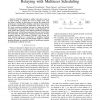Free Online Productivity Tools
i2Speak
i2Symbol
i2OCR
iTex2Img
iWeb2Print
iWeb2Shot
i2Type
iPdf2Split
iPdf2Merge
i2Bopomofo
i2Arabic
i2Style
i2Image
i2PDF
iLatex2Rtf
Sci2ools
122
click to vote
CISS
2007
IEEE
2007
IEEE
System-Level Performance of Cellular Multihop Relaying with Multiuser Scheduling
— Multihop relaying in cellular networks is seen as a viable strategy to address the need for higher data rates and better coverage. In this paper, we analyze the system-level performance of multicellular multihop networks in the presence of co-channel interference, and build upon prior work in [1][2], which considered multihop relaying in a single-cell setting. Considering an opportunistic hop-count routing algorithm, we study cellular sum capacity under different multiuser scheduling algorithms such as MaxCap, proportional fair, and round robin. We numerically investigate the competing interaction between multihop diversity and multiuser diversity, and discuss the areal diversity aspect as a byproduct of multihop relaying. Finally, we provide further practical design insights on cellular planning through our empirical results on interference statistics in multicellular multihop networks.
Related Content
| Added | 02 Jun 2010 |
| Updated | 02 Jun 2010 |
| Type | Conference |
| Year | 2007 |
| Where | CISS |
| Authors | Mohamad Charafeddine, Ozgur Oyman, Sumeet Sandhu |
Comments (0)

